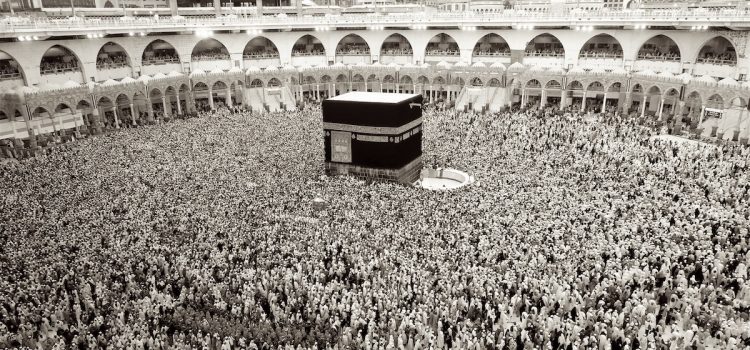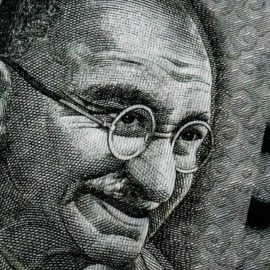

This article is an excerpt from the Shortform book guide to "The Autobiography of Malcolm X" by Malcolm X and Alex Haley. Shortform has the world's best summaries and analyses of books you should be reading.
Like this article? Sign up for a free trial here.
Why did Malcolm X go to Mecca? What did he learn during his time in the Middle East? Why did he change his name a second time?
In his autobiography, Malcolm X explains that he’d heard criticism that the Nation of Islam wasn’t truly Islamic. And, because he was still a firm believer in Islam, he decided he needed to learn more about the religion. What he found put him on a new path both religiously and politically.
Keep reading to learn about Malcolm X’s Mecca experience.
Malcolm X in Mecca
For Malcolm X, Mecca became an imperative. All Muslims are required to make a pilgrimage to Mecca at least once in their lifetime if they’re able. So, Malcolm X decided to go. Not only would he fulfill an obligation, but he would see for himself what Muslims in the Middle East were like.
(Shortform note: Most modern Muslims still don’t accept the Nation of Islam as a truly Islamic organization for a few reasons: First, the Nation of Islam’s first leaders, Fard and Muhammad, didn’t seem familiar with the teachings of the Quran (the Islamic holy book). Second, mainstream Islam holds that God is a strictly nonhuman entity—Muhammad, on the other hand, claimed that Fard was God’s human incarnation. Third, during Fard and Muhammad’s tenure, members practiced only three of the five pillars of Islam—Islamic practices seen as essential to the religion. One of those pillars is the pilgrimage to Mecca or hajj—adherents believe that the hajj cleanses their sins.)
During Malcolm X’s travels, he was continually surprised by how united Muslims in the Middle East were—it seemed that racism didn’t exist there, as people with all complexions and ethnic backgrounds treated each other with respect and dignity. All the pilgrims were spiritually equal, and that was all that mattered as they traveled to Mecca. This was the first time Malcolm X had experienced racial equality, and it bewildered and excited him to finally be treated as a human being by the general public.
(Shortform note: Although Malcolm X recounts experiencing racial harmony in the Middle East, contemporary scholars are divided as to how extensive anti-Black racism is in the area. Some experts have argued that Islam is uniquely antiracist, since its founding prophet, Muhammad, explicitly stated that no ethnic group was superior to another—which transformed Arab society. However, others argue that the Middle East has a long history of anti-Black thought, dating back to at least medieval times, and that this was fueled in part by the trans-Saharan slave trade, which lasted for over 1,300 years.)
Once Malcolm X got to Mecca, he was turned away—an admittance clerk wasn’t convinced he was a real Muslim, so he’d have to prove before a court that he was. In the meantime, he had to remain at the airport. Eventually, he called a friend of a friend—the son of a diplomat named Abd-Al-Rahman Azzam—who quickly had him released to his family’s home. The Azzams’ hospitality deeply touched Malcolm X—he explains that since they were white-complexioned, it caused him to rethink his beliefs about the supposedly inherent evil of white men. When he did go to court, he was declared a true Muslim, so he finally completed his pilgrimage to Mecca, continually wondering at the racial harmony he was finally experiencing.
(Shortform note: The elder Azzam would become the first Secretary General of the Arab League, which sought to unite Arab nations after it was established in 1945. He was also famous for writing a book, The Eternal Message of Muhammad, which argued that one of Islam’s purposes was to unite all people, regardless of race. His grandson—also named Abdul Rahman Azzam—is a historian who keeps his grandfather’s relationship with Malcolm X alive by discussing the continuing legacy of their battle against colonialism.)
Malcolm X says that, before he left Mecca, he wrote a letter to some of his family members, collaborators at the Muslim Mosque, Inc. (MMI), and the media about the impact his pilgrimage had made on his beliefs—signing the letter with a different name, El-Hajj Malik El-Shabazz. He explained that he now believed the spread of Islam was the only thing that could solve racism in the United States since the bonds of religious fellowship were stronger than racial differences could undermine. He also no longer believed that all white people were evil; instead, he believed that the next generation of white people would play a role in achieving racial unity.
(Shortform note: A handwritten copy of Malcolm X’s letter from Mecca was recently discovered in a New York storage locker and put up for auction. Experts note that the name he signed at the bottom of the letter was of great significance: “El-Hajj” is an honorable title assigned to those who’ve completed the pilgrimage to Mecca, and “Malik El-Shabazz” signified his conversion to Sunni Islam—the mainstream branch of the religion. He converted because he was inspired by Islam’s emphasis on religious unity—both the unity of God and the unity of worshippers. Malcolm X may have been right on some levels about Islam’s potential for unifying the races—American Muslims are the most racially diverse religious group in the US.)
After his pilgrimage was over, he traveled around the Middle East for a while. He discussed the plight of US racism with everyone who would listen—poor people and nobles, people of all colors, who were astonished, sad, and angry to hear about these conditions. He explains that this made him start thinking about how isolated from the rest of the non-white world Black Americans were—and how powerfully world-changing such international connections might be. This led him to venture to Africa.
(Shortform note: Experts note that Malcolm X expressed explicitly anti-colonial politics during this time of his life, as he sought to help his followers understand how the struggles of people of color all over the world were interrelated—and that the sources of their oppression were white imperialists and colonizers. Multicultural unity against colonial power gained steam in the 1960s, as activists championed solidarity between Black and brown people and formed groups like The Rainbow Coalition—a Chicago socialist group that united Black, Latino, and white working-class revolutionaries.)

———End of Preview———
Like what you just read? Read the rest of the world's best book summary and analysis of Malcolm X and Alex Haley's "The Autobiography of Malcolm X" at Shortform.
Here's what you'll find in our full The Autobiography of Malcolm X summary:
- Malcolm X explains why he believed what he believed
- The historical and sociological context surrounding Malcolm X’s life
- Why Malcolm X was such a controversial figure






